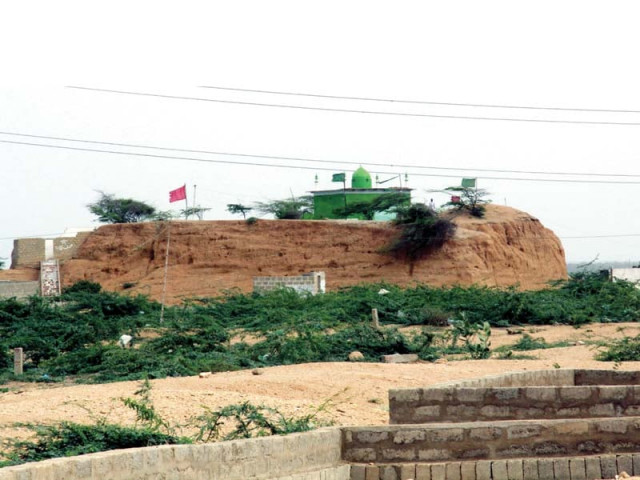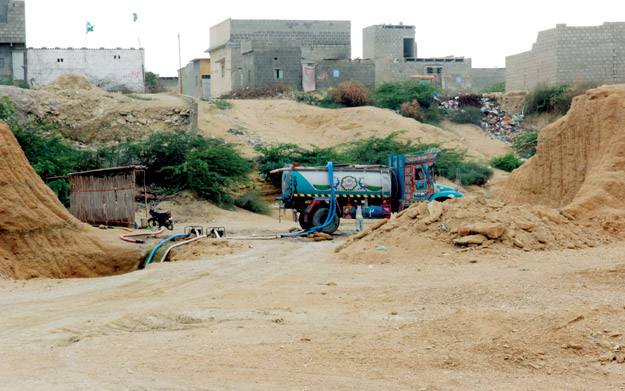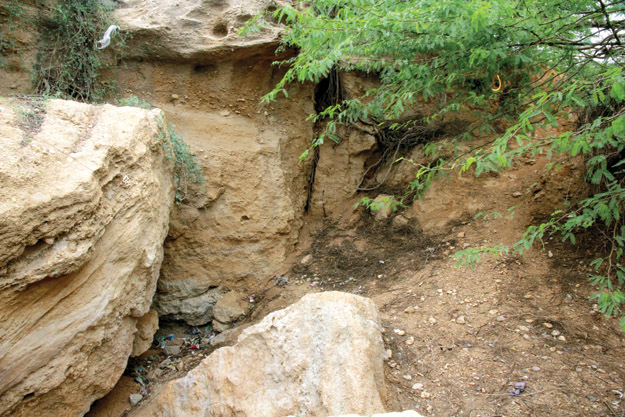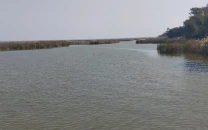Abandoned: Lost charm of Sufi saint's shrine in Chashma Goth
Hot water spring of Hazrat Inayat Ali Shah's shrine dries up due to illegal hydrant

The shrine used to host hundreds of people daily but ever since the spring dried up, barely 20 to 30 people arrive here on a daily basis, according to the shrine’s caretaker. PHOTO: ATHAR KHAN/EXPRESS
Sharing the shrine's history that goes back 400 years, 69-year-old Zaheer Mangoo, a resident of Chashma Goth, said that it was one of the main attractions of the town and people from all over Sindh used to visit the shrine. Mangoo reminisced how he, along with his parents, used to visit the shrine and take holy baths in the spring. It was believed that the water could provide cure to many skin diseases, he added.
Speaking to The Express Tribune, the shrine's caretaker, Iqbal Khalifa, said it is believed that the spring water used to come through the same channel as that of the hot water spring at Sufi saint Sakhi Sultan Baba's shrine at Manghopir. "The same shrine used to host hundreds of people daily but since the spring had dried up, barely 20 to 30 people arrive here on a daily basis," Khalifa said. He added that greed has made people heartless and they did not even spare a natural hot water spring. According to Khalifa, he has filed many complaints with the police about the owner of the illegal hydrant, who is an influential man in the area. Since the hydrant started getting water close to the hot water spring, the water has dried up because of it, he claimed.

Local MPA Shafi Muhammad Jamot of Pakistan Muslim League-Nawaz told The Express Tribune that he has forwarded complaints of many such illegal hydrants, however, no action has been taken by the relevant authorities. According to Jamot, water is fetched from hills beside Hazrat Inayat Ali Shah's shrine and is sold for around Rs4,000 in posh areas of Defence Housing Authority and Clifton, while residents of the area are deprived of water.
Speaking about the significance of hot water springs and shrines, religious scholar Jamil Rathod said that it is a gift from God to his pious preachers. "Wherever such personalities are buried, God has made arrangements for water for those who visit them and to no surprise, water from these springs is beneficial for many diseases," he added.
Explaining the geological reason behind these springs, University of Karachi geology department Professor Adnan Khan said that usually most of the shrines are situated on high hills and other high topographical locations. According to him, water erupts from fault zones in the ground because of which there are hot water springs around these shrines. Speaking about the reason behind the change in the flow of water direction, he said these hydrant pumps are powerful enough to easily attract water towards them, which leads to drying up of these springs.

The Supreme Court had ordered on September 8 the government and Karachi Water and Sewerage Board to immediately shut down all legal and illegal hydrants in the city and renew their tenders within five weeks. However, the government has yet to follow these orders. Speaking to The Express Tribune, local government minister Jam Khan Shoro claimed that immediate action will be taken against the hydrant operating near Hazrat Inayat Ali Shah's shrine. He added that they have already shut down many illegal hydrants in the city.
Special assistant to the chief minister for Auqaf, Ghulam Shah Jillani, said that whether the shrines come under the Auqaf department or not, it is the government's duty to protect these holy places. Jillani said that he has asked the relevant officers to investigate the matter and report back to him in a few days.
Published in The Express Tribune, December 29th, 2016.



















COMMENTS
Comments are moderated and generally will be posted if they are on-topic and not abusive.
For more information, please see our Comments FAQ